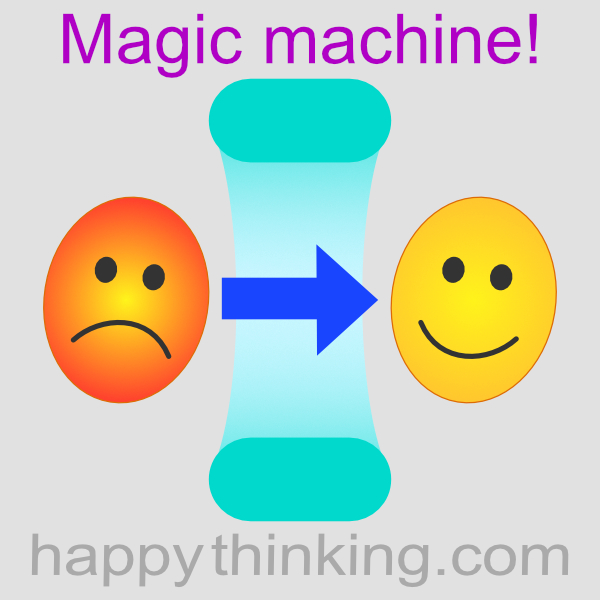In the previous sections, we learnt about common unhelpful thought patterns that can contribute to feelings of unhappiness. Now that you understand these unhelpful thought patterns, you will be able to recognise such thoughts when they happen in your mind. However, while recognition of these thoughts themselves might make you feel better, the higher benefits of Happy Thinking will come to you when you change unhelpful thoughts to more helpful ones.
It would be wonderful if there were a magical machine that could rewire our brains to think in more helpful ways. Unfortunately, such a machine does not exist, and I doubt something like that would be even possible in our lifetime. While our scientific understanding of how the brain works has progressed significantly, we still know very little.

However, fortunately for us, we now have a more realistic solution available. That is, the human mind possesses an extraordinary power: the ability to “rewire” itself. Our minds can analyse our thoughts and change them.
As part of Happy Thinking, I will share with you various “psychological tools” that your mind can use to change unhelpful ways of thinking. It will be much like how a car mechanic uses multiple tools to fix a car that is not running well. However, unlike the toolbox used by a car mechanic, the Happy Thinking toolbox weighs nothing! The tools are various simple mental techniques one can use in one’s daily life.
Some of the psychological tools that I will share with you will help you better notice when you are having unhelpful thoughts. i.e. they will help you become more “sensitive” in detecting unhelpful thoughts when they happen in your mind. Other tools can help you transform unhelpful thoughts into more helpful ones.
When an engineer uses tools to repair a machine, they must select the correct tool for the job. Not all tools will be helpful to fix a given fault. Also, sometimes, a fault will need multiple tools to be used together. The use of psychological tools is no different. You will need to try various tools to see which ones work for you. Additionally, you may need to use more than one tool simultaneously.
You may find that some of the psychological tools may appear to be “simple”, and this may put you off. Do not confuse simple with being the same as being “ineffective”! Many solutions in life do not have to be complex, and the key is to judge for yourself how helpful or not something is. Do not prejudge; instead, give the tools a chance before putting them away.
Unhelpful thinking patterns can develop over many years and become entrenched in one’s mind, making it resistant to change. Therefore, please allow the tools time to work. Do not expect instant cures.
When it comes to the various tools, remember to keep an “open mind” to them and give them a chance. If your mind is closed, then the tools won’t have the access they need to be effective.